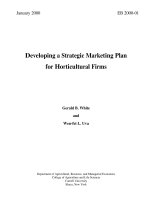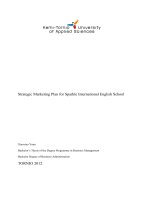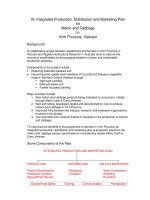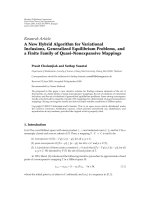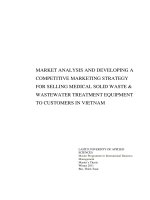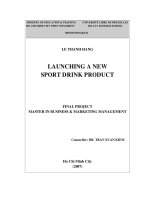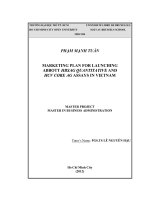Marketing plan for launching a new hybrid waxy corn seed milky 36 in vietnam market
Bạn đang xem bản rút gọn của tài liệu. Xem và tải ngay bản đầy đủ của tài liệu tại đây (7.13 MB, 71 trang )
i
TRƯỜNG ĐẠI HỌC MỞ TP.HCM
UNIVERSITÉ LIBRE DE BRUXELLES
HO CHI MINH CITY OPEN UNIVERSITY
SOLVAY BRUSSELS SCHOOL
MBMM4
TRAN CAO DAI
MARKETING PLAN FOR LAUNCHING A NEW HYBRID
WAXY CORN SEED MILKY-36 IN VIETNAM MARKET
MASTER PROJECT
MASTER IN BUSINESS & MARKETING MANAGEMENT
Tutor’s name: Dr. Vu The Dung
Ho Chi Minh City
(2010)
ii
COMMITMENT
This thesis contains no material that has been accepted for the award of any other degree of
diploma in any university or other institution and to the best of my knowledge contains no material
previously published or written by another person, except where due reference is made in the text
of this thesis.
In this study, the in depth interview is conducted by myself, the interviewees are listed out in the
thesis their address and contact number and with a voice tape recording . Thus, it has high level of
trust, confidence and agreement.
This information source is strictly warned by Dekalb (Vietnam) Co., Ltd to use for internal business
purpose and not allowed to be spread out excepting for the jury of Solvay Business School and
some marketing professionals including the MBMM tutor.
iii
ACKNOWLEDGEMENTS
I wish to express my profound gratitude and great appreciation to my advisor Dr. Vu The
Dung for his valuable guidance, advice and encouragement throughout the research study.
Special thanks are extended to my colleagues at Monsanto (Thailand) Representative Office
for taking interest and giving valuable suggestions to improve the content of this study as well
as providing me the materials needed for the research.
Taking this opportunity, I would also like to thank all lecturers, mentors, HCMC Open
University staffs and my classmates for their assistance and co-operation during my twoyear’s time at the MBMM program of Solvay Brussels School.
I remain indebted to my beloved family, friends for their valuable encouragement and
unceasing supports in my academic pursuits.
iv
TUTOR’S COMMENTS
Student name: TRAN CAO DAI
Attitude: hard working
Content: well designed and structured
Method and technique: appropriate
Data analysis: good and reliable data sources and analysis
Recommendation: Provide some good recommendations
Overall comments: The project has been successfully completed and met all the
objectives. Very good.
Tutor
Dr. Vu The Dung
v
LIST OF ABBREVIATIONS
ABBREVIATIONS
COGs
MEANING
Cost of Goods sold
DUS
Differentiation, Uniformity, Stability tesing
EWIC
East West International Company
EWJVSC
East West Joint Venture Seeds Company
FCPA
Foreign Corrupt Practice Acts
FY
Fiscal year
GMO
genetically modified organism
NCVESC
National Center for Variety Evaluation and Seed Certification
OP
opened pollination variety
P&L
Profit and Lost
R&D
Research and Development
SSC
Southern Seeds Company
SWOT
Strength, Weakness, Opportunity and Threat
USD
US Dollar
VCU
Value of Cultivation and Use
VND
Vietnam Dong
VNSC
Vietnam National Seeds Company
vi
TABLE OF CONTENTS
CHAPTER
PAGE
Title Page ............................................................................................................ i
Commitment ....................................................................................................... ii
Acknowledgements ............................................................................................ iii
Tutor’s comments ............................................................................................... iv
Abbreviations ..................................................................................................... v
Table of Contents ............................................................................................... vi
Appendices ........................................................................................................ ix
References ......................................................................................................... ix
List of Figures and Tables .................................................................................. x
1
2
3
4
INTRODUCTION .............................................................................................. 1
1.1
Rationales of research study ................................................................... 2
1.2
Problem statement .................................................................................. 5
1.3
Objectives of the research ....................................................................... 5
1.4
Scopes and limitations ............................................................................ 5
1.5
Managerial implications ......................................................................... 6
1.6
Research Methodology ........................................................................... 6
LITERATURE REVIEW ................................................................................... 7
2.1
Introduction............................................................................................. 7
2.2
Marketing plan ........................................................................................ 7
2.3
The contents of marketing plan .............................................................. 8
RESEARCH DESIGN........................................................................................ 12
3.1
Problem definition .................................................................................. 12
3.2
Methodology design ............................................................................... 13
3.3
Information need ..................................................................................... 13
3.4
Conduct an in-depth interview................................................................ 14
3.5
Sampling and respondents ...................................................................... 15
FINDINGS AND ANALYSIS ........................................................................... 16
vii
5
4.1
Market definition .................................................................................... 16
4.2
Product performance ............................................................................... 17
4.3
Market research ...................................................................................... 20
4.3.1
Market situation and the key success factors ........................... 21
4.3.2
Broker’s role ............................................................................ 24
4.3.3
Advertising and brand awareness ............................................ 25
MARKETING PLAN ......................................................................................... 27
5.1
Company profile ..................................................................................... 27
5.2
The Objectives of company .................................................................... 27
5.3
Current Situation of Waxy corn market in Vietnam ......................................... 28
5.4
5.5
5.3.1
Market definition ..................................................................... 28
5.3.2
Market size ............................................................................... 29
5.3.3
Market segmentation................................................................ 29
5.3.4
Industry structure and strategic groupings ............................... 29
5.3.5
Competition and market share ................................................. 32
5.3.6
Competitors' strengths and weaknesses ................................... 33
5.3.7
Market trends ........................................................................... 34
Consumer Analysis ................................................................................. 34
5.4.1
Nature of the buying decision .................................................. 34
5.4.2
Demographics .......................................................................... 35
5.4.3
Participants............................................................................... 35
5.4.4
Buyer motivation and expectations.......................................... 36
5.4.5
Loyalty segments ..................................................................... 36
Dekalb (Vietnam) - Current Situation .................................................... 36
5.5.1
Company resources .................................................................. 36
5.5.2
Objectives of Milky-36 launching ........................................... 36
5.6
Summary of Situation Analysis .............................................................. 37
5.7
Marketing Plan for launching Milky-36 in Vietnam Market.................. 39
5.7.1
Product – Waxy corn Milky-36 ....................................................... 39
viii
5.8
5.9
6
5.7.2
Price ......................................................................................... 40
5.7.3
Promotion................................................................................. 41
5.7.4
Distribution .............................................................................. 42
Implementation ....................................................................................... 43
5.8.1
Sales forecast ........................................................................... 43
5.8.2
5 years sales forecast of Milky-36 ........................................... 43
5.8.3
Marketing activities support the launching 2011 ..................... 44
5.8.4
Promotion equipments ............................................................. 44
Financial Summary ................................................................................. 45
CONCLUSION AND RECOMMENDATION ................................................. 46
6.1
Conclusions............................................................................................. 46
6.2
Recommendations................................................................................... 46
ix
APPENDICES
Appendix 1.1:
Certificate of Investment issued by Ho Chi Minh City People’s
Committee
Appendix 1.2:
Decision 188/QĐ-TT-CLT – Milky-36 permanent approval
Appendix 3.1:
In-depth interview structured questionnaires for brokers
Appendix 5.1:
Milky-36 leaflet
Appendix 5.2:
Milky-36 poster
REFERENCES
x
LIST OF FIGURES AND TABLES
FIGURES
PAGE
Figure 4.1: Dekalb (Vietnam)’s strategic crops market growth assumption ........................... 16
Figure 4.2: Dekalb (Vietnam) - Vegetable Seeds Division – 5 years growth planning .......... 17
Figure 5.1: The hybrid waxy corn seed market share by company, 2010 ............................... 32
Figure 5.2: Waxy corn business model in Vietnam ................................................................. 35
TABLES
PAGE
Table 1.1: Corn planting area in Vietnam, 2009...................................................................... 2
Table 3.1: Kvale’s 7 stages of conducting in depth interview .............................................................. 14
Table 3.2: Respondent’s profile ............................................................................................................ 15
Table 3.3: Topics to discuss with respondents in depth ........................................................................ 15
Table 4.1: Yield of Milky-36 in Spring 2008 in Northern provinces ....................................... 17
Table 4.2: Yield of Milky-36 in Winter 2008 in Northern provinces...................................... 18
Table 4.3: Yield of Milky-36 vs current hybrids across Vietnam biological regions in
Winter-Spring 2008, Spring-Summer 2009 and Summer-Autumn 2009 ............... 18
Table 4.4: Milky-36 agricultural characteristics and taste compare to current hybrids .......... 19
Table 4.5: The interested traits vs product performance of current hybrid waxy corns
in 2008 .................................................................................................................. .20
Table 5.1: Waxy corn planting area forecast (2009 – 2015) ................................................... 29
Table 5.2: Vietnam Waxy Corn Players analysis .................................................................... 33
Table 5.3: Summary of the Business Opportunities and Threats ............................................ 37
Table 5.4: Summary of the Company’s Strengths and Weaknesses ........................................ 37
Table 5.5: Milky-36- Monthly sales forecast in 2011 ............................................................. 43
Table 5.6: Milky-36- Long Range Planning (FY11-FY15) ..................................................... 43
Table 5.7: Marketing activities support launching plan in 2011 ............................................... 44
Table 5.8: Profit and Loss (P&L) analysis in 5 years ............................................................... 45
-1-
CHAPTER 1: INTRODUCTION
Monsanto was found in 1901 and located in St Louis, Missouri, USA.
It now is a
multinational corporation in agricultural biotechnology and being a big seed supplier to farmers
around the world with seeds for field corn, soybean, and cotton under brand of Dekalb. With an
effective investment in Research and Development, Monsanto has applied high technology,
innovation into agricultural products that increased productivity help farmers earning more
benefits, allowing them to reinvest in their farms. Monsanto also aims at reducing agricultural
impaction given by environmental conditions that are often changing such as drought and low
water supplying, therefore, seed and traits are among the key drivers for business growth onward
for the company.
Concerning daily food, people want their food to be more nutrient, healthier, and being
planted in friendly environment such as less pesticide, fungicide spraying… Monsanto has made
significant efforts to play a vital role in vegetable seeds breeding, producing and trading. In
March 2005, Monsanto acquired Seminis Vegetable Seeds, a largest vegetable seed company in
the world, which leads Monsanto to become the largest seed supplier in the world for both row
crop (field corn, soybean, cotton) and vegetable.
Monsanto’s representative office in Vietnam was set up in 1995 under Monsanto (Thailand)
Co., Ltd which is successfully providing field corn seed to growers in Vietnam market.
Nowadays, Monsanto is providing both row crop seed which is main corn seed and many kind of
vegetable seeds in Vietnam market. In 2010, Monsanto is also the first company testing GMO
corn seed in Vietnam.
Monsanto (Thailand) Co., Ltd has been converted to be a 100% foreign capital company in
Vietnam, with the new entity of Dekalb (Vietnam Co)., Ltd on 26th August 2010 (Appendix 1.1)
with a mission of modernizing Vietnam agriculture by the up-to-date biotechnology via seed
solution which will be generating a 25 million USD in sales revenue by the year 2015.
1.1
Rationales of research study:
-2-
Corn (maize) has been a secondary food crop in Vietnam for a very long time, next to rice.
In the past, most of corn is for human consumption, Vietnamese consumed as a daily food,
especially people in rural areas and mountainous regions, that was while corn (also called sticky
or waxy corn). Recently, corn area in Vietnam is increasing rapidly to serve the husbandry and
animal feed industry in Vietnam, 90% of corn planting area is to plant field corn to serve the
industry. The rest of 10% is planted waxy corn and sweet corn for human fresh consumption
which was used to use OP seed previously.
Table 1.1: Corn planting area in Vietnam, 2009
No
Kind of
corn
Corn area (ha)
Seed demand (ton)
Market value ($K)
OP
Hybrid
OP
Hybrid
OP
Hybrid
825
36,577.89
3,153.6
3,449.20
01
Field corn
209,000
891,000
3,135
13,365.0
02
Waxy corn
98,550
36,450
1,971
437.4
03
Sweet corn
0
5,000
Total
307,550
932,450
375.00
25.0
5,106
13,827.4
3,978.6
40,402.09
Source: Monsanto (Thailand) Co., Ltd, 2009
Waxy corn was previously grown from OP seed which gives lower yield, low uniformity in
plants and ear size, plant weakness, poor eating quality and susceptible to many kinds of pest
damage. In 2006, Syngenta Company launched the first hybrid waxy corn “Wax 44” into
Vietnam market and obtained a very successful conversion from OP to hybrid seed due to:
-
Growers inherit many good agricultural characteristics such as higher yield, higher
uniformity, strong plant, better in pest resistance, more sellable ears …
-
End consumers who direct consume product as food had also enjoyed a better taste, more
nutrient, and more eatable portion,…
With the benefits above, market trend is rapidly converting from OP variety to hybrid seed.
In 2009, the conversion rate has been recorded at 27% and the forecast for this conversion is at
15% each year on the current OP area to hybrid, therefore, in next five year 2015 the conversion
would be at 50 percentages, the market value of hybrid waxy corn seed would be at 8 millions
-3-
USD. That is why there are many companies are attempting to penetrate Vietnam waxy corn
market such as Syngenta, DuPont, East West Seeds Company, Vietnam National Seeds
Company, Southern Seeds Company,…
In 2006, Monsanto has defined waxy corn is an additional key crop which will drive
Monsanto seed business in Vietnam for long term. Thus, with the advantage technology in
breeding corn seed, Monsanto has started to invest into waxy corn breeding program. In 2009, the
first hybrid waxy corn named “Milky-36” has been developed by Monsanto which is initial
evaluated can adapt in Vietnam condition and the market needs in term of high yield, high
uniformity of plant and ear size, attractive ear appearance, resistant to common disease on corn
and especially, it is evaluated as the best eating quality at this moment.
According to Vietnam regulation, corn (maize) is considered as a main food after rice,
which is listed in The National Food Security Assurance Policy. For this reason, in order to
launch a new hybrid corn seed in Vietnam, it must be tested by The National Testing Center for
Seeds, Plant Products and Fertilizers with 2 kinds of experiments:
-
DUS: This trial normally takes 1 and a half year with 3 seasonal replications in locations
which indicate for a large scale of ecology in all country to evaluate the differentiation, the
uniformity and the stability of a new hybrid. Then,
-
VCU: This is to evaluate the Value of Cultivation and Use, this is a large scale trial
conducted with 1 replication only in the best locations which demonstrate a high
performance of new hybrid in DUS trial. It takes 6 months to complete the testing.
Finally, all trial data must be collected and presented to the Scientist Committee of
Agriculture Ministry to get their permanent approval for official commercializing in Vietnam.
Milky-36 has already been permanent approved in June 2010 for official commercializing
in Vietnam (Appendix 1.2) and it is ready for launching in April 2011, it is targeted to reach 100
ton of seed in 2015 takes 15% market share which will generates USD 1 million in sales revenue.
Thus, Milky-36 will be a key product for waxy corn segment and contributes a significant sales
figure at 5% in 2015 of Dekalb Vietnam Co., Ltd.
However, when there are more players come into the market, the market requires a higher
quality and creates a new value in competition, such as:
-4-
-
There will be more options for growers, they can ask for higher standard in common
disease resistance because they need to minimize their investments in pest control, they
may need a new hybrid with earlier maturity for a faster rotation of cultivation, they also
may need a new hybrid with a better agronomic characteristics such as higher uniformity of
plant and ear size to get higher sellable ear rate,…
-
The brokers play the most important bridge role between grower and end consumer through
ear corn retailer, they bring grower’s product to the market, they are somehow acting as a
market control, keeping an balanced supply and demand, they can advise growers to use the
best hybrid which is good in disease and insect resistance, higher yield, earlier maturity,
good eating quality …Alternatively, they may take risk when the market is over supply
therefore, they will advise grower to grow a variety which provides a longer self life in
order to keep longer in storage or transportation,…
-
Ear corn retailers also play a bridge in market feedback because they are daily direct
contact with end consumer, they know well what are end consumer needs and wants, then
feedback to the broker how to select the best hybrid in order to fit the end consumer needs.
-
The end consumers play an important role in market feedback, their need is a very specific
requirement for eating quality, they can only accept a variety which provides the best taste,
softness, aromatic flavor, bigger ear shape, …
Obviously, as above mentioned, the role of broker is the most important which influences
to the success of new hybrid waxy corn launching, perhaps it is due to:
-
His business will get trouble if he buys a poor eating quality of fresh waxy corn that makes
him unable to sell. If he cannot sell product to wholesales market he will also be unable to
return money to the grower, due to he buys from grower in credit term.
-
If grower plants a poor eating quality variety or a variety with short self life, broker will
not buy from grower in order to protect his business or buy with a lower price compare to
other variety which he advises grower to use.
-
In fresh consumption market, the storage ability is evaluated as the key driver leads to a
broker’s success, in case of unexpected circumstance, fresh product is unable to sell out in
1 or 2 days, the fresh quality is vanished.
-5-
Therefore, the first successful launching of Syngenta for hybrid Wax 44 was decline due to
its too poor eating quality, end consumer has eliminated Wax 44 and replaced by others which
provided a better eating quality. Syngenta even then launched 2 new hybrids but also failed.
Following by several players also failed to launch their new hybrids, they are almost focused on
distribution channel how to provide a distributors a margin as high as possible, spending much in
advertising to growers, setting up as many as demonstration fields to show up product
performance in the field to attract growers. They did not pay much attention to the broker’s role.
Then, they are hard to re enter the market as a result of failure to focus on broker role in fresh
product business.
1.2
Problem statement:
To define the key factors influence to the waxy corn market in Vietnam, this research is to
study deeper the role of waxy corn broker in the chain of Seed Distributor – Seed Dealer –
Grower – Broker – Wholesaler – Retailer in Ho Chi Minh City waxy corn market, in order to
obtain an appropriate strategy to approach broker and gain his support in the Milky-36 launching.
1.3
Objectives of the research:
-
To understand the factors influence to the new hybrid waxy corn launching into the
market.
-
To establish an appropriate marketing plan to satisfy influenced factors above for a
success launching.
1.4
Scopes and limitations:
-
The marketing plan for launching new hybrid waxy corn seed Milky-36 is applied in 2
geographical regions in the south Vietnam: South East Region and Mekong River Delta.
-
The mentioned study is conducted on brokers in Ho Chi Minh City, Tay Ninh and Dong
Nai province.
The results obtained from the survey could be biased because of information collected from
the interviewees with different backgrounds.
1.5
Managerial implications:
-6-
-
The study is beneficial to the company to better understanding the influenced factors.
Therefore, company will be able to establish an appropriate marketing plan to penetrate the
waxy corn market successfully.
-
The study also reflects what competitions are attempting to do to penetrate the market and
how are they performing. Therefore, company will determine where it is now in the market
and what should do differentiate and better in the marketing plan.
-
In a competitive marketplace where businesses compete for customers, customer
satisfaction is seen as a key differentiator and increasingly has become a key element of
business strategy (Gitman, Lawrence J and Carl D. McDaniel -2005). Therefore, the study
is to provide company the insights and needs of customers, their behaviors for the further
product development.
1.6
Research Methodology
Qualitative research is applied to collect the insights, needs, key perceptions in terms of
strength and weaknesses of current hybrid waxy corn varieties in the market … these dimensions
will help to define the influenced factors which are to support to the marketing plan.
1.6.1 Primary resource:
In depth interview method is used in this study to interview brokers individually who are
defined playing an important role in a supply chain to find out the needed information.
Broker: 3 brokers in Ho Chi Minh, Tay Ninh and Dong Nai province.
1.6.2 Secondary sources:
-
Using Monsanto annual report, Monsanto trial report, Monsanto market information.
-
Using The National Testing Center for Seeds, Plant Products and Fertilizers
-7-
CHAPTER 2: LITERATURE REVIEW
2.1
Introduction:
Nowadays, in a very competitive marketplace a strategy that insures a consistent approach
to offering a product or service in a way that will outsell the competition is critical. However, in
concert with defining the marketing strategy we must also have a well defined methodology for
the day to day process of implementing it.
In the process of creating a marketing strategy we must consider many factors. Of those
many factors, some are more important than others. Because each strategy must address some
unique considerations, it is not reasonable to identify 'every' important factor at a generic level.
However, many are common to all marketing strategies.
Therefore, this chapter will review the literature involving marketing planning and its
process to approach the market place. It is also highlight the important factors in the process
which maybe much more influence to the marketplace.
2.2
Marketing Plan
Any manager will readily agree that a sensible way to manage the sales and marketing
function is to find a systematic way of identifying a range of options, to choose one or more of
them, then to schedule and cost out what has to be done to achieve the objectives.
Marketing planning, then, is simply a logical sequence and a series of activities leading to
the setting of marketing objectives and the formulation of plans for achieving them. Companies
generally go through some kind of management process in developing marketing plans. In small,
undiversified companies, this process is usually informal. In larger, more diversified
organizations, the process is often systematized. Conceptually this process is very simple, and
involves a situation review, the formulation of some basic assumptions, setting objectives for
what is being sold and to whom, deciding on how the objectives are to be achieved and
scheduling and costing out the action necessary for implementation. (Malcolm McDonald, 2007)
Further definition by Wikipedia, 2009, the area of marketing planning involves forging a
plan for a firm's marketing activities. A marketing plan can also pertain to a specific product, as
well as to an organization's overall marketing strategy. Generally speaking, an organization's
marketing planning process is derived from its overall business strategy. Thus, when top
-8-
management is devising the firm's strategic direction or mission, the intended marketing activities
are incorporated into this plan. There are several levels of marketing objectives within an
organization. The senior management of a firm would formulate a general business strategy for a
firm. However, this general business strategy would be interpreted and implemented in different
contexts throughout the firm
A marketing plan is a written document that details the necessary actions to achieve one or
more marketing objectives. It can be for a product or service, a brand, or a product line.
Marketing plans cover between one and five years. A marketing plan may be part of an overall
business plan. Solid marketing strategy is the foundation of a well-written marketing plan. While
a marketing plan contains a list of actions, a marketing plan without a sound strategic foundation
is of little use.
2.3
The contents of marketing plan
According to Michael Baker (2008).The main contents of a marketing plan are:
•
Executive Summary
•
Current Situation - Microenvironment
•
−
Economy
−
Legal
−
Government
−
Technology
−
Ecological
−
Supply chain
Current Situation - Market Analysis
−
Market definition
−
Market size
−
Market segmentation
−
Industry structure and strategic groupings
−
Competition and market share
−
Competitors' strengths and weaknesses
−
Market trends
-9-
•
Current Situation - Consumer Analysis (According to Quick MBA – Marketing plan
based on consumer and competitor analyses)
•
−
Nature of the buying decision
−
Participants
−
Demographics
−
Psychographics
−
Buyer motivation and expectations
−
Loyalty segments
Current Situation - Internal
−
−
•
•
Company resources
+
Financial
+
People
+
Time
+
Skills
Objectives
+
Mission statement and vision statement
+
Financial objective
+
Marketing objectives
+
Long term objectives
Summary of Situation Analysis
−
External threats
−
External opportunities
−
Internal strengths
−
Internal weaknesses
−
Critical success factors in the industry
−
Our sustainable competitive advantage
Marketing research
−
Information requirements
−
Research methodology
- 10 -
−
•
•
Research results
Marketing Strategy - Product
−
Product mix
−
Product strengths and weaknesses
−
Product life cycle management and new product development
−
Brand name, brand image, and brand equity
−
Product portfolio analysis
Marketing Strategy (Quick MBA – Marketing Plan Basics) - segmented marketing
actions and market share objectives
•
•
•
−
By product,
−
By customer segment,
−
By geographical market,
−
By distribution channel.
Marketing Strategy - Price
−
Pricing objectives
−
Pricing method (cost plus, demand based, or competitor indexing)
−
Pricing strategy (skimming, or penetration)
−
Discounts and allowances
−
Price elasticity and customer sensitivity
−
Price zoning
Marketing Strategy - promotion
−
Promotional goals
−
Promotional mix
−
Advertising reach, frequency, flights, theme, and media
−
Sales force requirements, techniques, and management
−
Sales promotion
Marketing Strategy - Distribution
−
Geographical coverage
−
Distribution channels
- 11 -
−
•
Implementation
−
•
•
Physical distribution and logistics
Personnel requirements
+
Assign responsibilities
+
Give incentives
+
Training on selling methods
−
Financial requirements
−
Management information systems requirements
−
Month-by-month agenda
−
Monitoring results and benchmarks
−
Adjustment mechanism
Financial Summary
−
Assumptions
−
Pro-forma monthly income statement
−
Contribution margin analysis
−
Breakeven analysis
Appendix
−
Pictures and specifications of the new product
−
Results from research already completed
- 12 -
CHAPTER 3: RESEARCH DESIGN
3.1
Problem definition
Vegetable or fresh human consumption market currently in Vietnam is being an opened or
less controlled markets, therefore, the market of fresh agricultural products are always unstable
due to many factors influence to this market, such as:
-
The supply is over or less than the demand.
-
Natural conditions as flooding or drought.
-
Unexpected troubles as transportation
-
ect …
In this case, broker plays very important roles to release or guarantee farmer’s products,
they bring farmer’s products to wholesales market, to end consumer. Thus, they understand very
well the expectation of farmer, wholesaler, retailer and end consumer. Together with wholesaler,
broker acts somehow as a market controller. Therefore, their role is undeniable in the fresh
human consumption.
In waxy corn market, farmer sells fresh ear corn to broker only, broker buys corn from
farmer all year round to supply to the wholesale market, and wholesaler sells to retailer, retailer
sell to end consumer. Although farmer buys waxy corn from seed dealer, but has to follow
broker’s advice a specific variety which meets their expectation in attractive ear shape, good
taste, long storage ability,… otherwise, broker will not buy or buy fresh ear corn from farmer
with a low price than a variety which he or she has mentioned. Alternately, due to only sell to
brokers, farmer has to accept a late payment term from broker, thus, if broker sells fresh ear
easily, farmer will receive their money smoothly, otherwise, farmer will be hard to receive their
money or has to discount to broker,… Therefore, all waxy corn fresh ear market is being
controlled by broker.
Milky-36 has been trialed in Vietnam since 2008 to test its performance in term of
adaptability, pest resistant, yield and eating quality and approved by the Scientist Committee of
Agriculture Ministry in September 2010 as the Decision No: 188/QĐ-TT-CLT. Meanwhile, in
order to obtain a solid acceptance by market locally, company has conducted many
- 13 -
demonstration fields in many geographical target markets and it was suggested locally to release
to the market in the soonest time. It means that Milky-36 is eligible for commercial launching in
Vietnam rightly.
Company set up the marketing plan for launching Milky-36, in which broker is defined as
the expert in this field and his roles are the most important factors which influence to the
launching. This research is to provide a chance to verify company definition of broker’s role in
Vietnam waxy corn market.
3.2
Methodology design
As definition, a research objectives is to deeper analyze and find out the influenced
factors which will be provided by broker who directly buys fresh ear corn from farmer and sells
to wholesale market or retailer. Therefore, the appropriate method to approach them in order to
pick up all detailed and needed information is in depth interview method.
An in depth interview is a qualitative research technique that allows person to person
discussion. It can lead to increased insight into people’s thoughts, feelings and behavior on
important issue. This type of interview is often unstructured and therefore permits the interview
to encourage a respondent to talk at length about the topic of interest.
The research is conducted by in depth interviewing 3 biggest brokers individually who
currently supply fresh ear corn to Ho Chi Minh City market in order to collect the insights, needs,
key perceptions in terms of strength and weaknesses of current hybrid waxy corn varieties in the
market. The result of this research helped to discover Insights & Needs when brokers are carry
out their business, to discover their attitudes, beliefs and related behavior with a hybrid waxy
corn variety, to discover the brand attributes, to discover key drivers, influencing elements. The
findings will be a foundation to set up a marketing plan for launching a new hybrid waxy corn
seed Milky-36 in the market.
3.3
Information need:
The study is to deeply analyze and highlight broker’s roles which are influencing to
current waxy corn market in Ho Chi Minh City and surrounding provinces, these are:
-
The role of “promoter”.
-
The role of “buyer”.
- 14 -
-
The role of “market driver”
Therefore, information which regards to these roles to discover insights and needs, to
develop the key product concept of current waxy corn varieties in the market, to discover the
attitudes, beliefs or related behavior of broker, to discover the brand attributes and key
drivers,…will be structured in the questionnaire and asking during the interview to find out the
influenced factors of the launching new hybrid waxy corn seed.
3.4
Conduct an in-depth interview
Kvale (1996) details seven stages of conducting in-depth interviews. They include thematizing,
designing, interviewing, transcribing, analyzing, verifying, and reporting. Each step will be briefly
examined below with strategies for implementation.
Table 3.1: Kvale’s 7 stages of conducting in depth interview
•
Asking and probing for broker’s opinion about what they determine
evaluate factors which influence to the current waxy corn market.
•
Using in-depth interview method to deeper analyze the determined
factors by interview brokers who are current playing their roles in the
waxy corn market.
Thematizing
•
Key information necessary from in depth interview include: product
performance benefits or losses to farmer or broker, farmer
expectation, broker’s expectation, consumer’s expectation, factors
influence to the current waxy corm market.
•
Design an interview guide which includes questionnaire, actual
questions.
•
Design questionnaire to include time, date and place of interview.
The interviews are going to be carried out in Tay Ninh, Ho Chi Minh
Designing
City and Dong Nai because the most professional broker’s activities
are to serve Ho Chi Minh City market.
Interviewing
•
Actual questions include: as in the list of questionnaire
•
Interviewer needs to introduce him/her self to establish a good
rapport with the interviewees. Asking for audiotape recording
- 15 -
•
Guide conversation towards the objectives and goal of the interview.
•
Then, proceeding to conduct the interview with designed questions.
Write a report which will organize broker’s roles to highlight the
Transcribing
factors influence to the current waxy corn market, followed by the
answers with the help of recorded audiotape, and typically highlighted
text.
•
Determine the meaning of information which regards to the role of
broker, gathered in relation to purpose of the study.
Analyzing
•
Look for theme, commonalities and patterns to try to make sense
of the above information.
•
If more questions arise and needs clarity to serve the purpose of
the study then another in-depth interview should be conducted.
Verifying
Reporting
3.5
Verify credibility and validity of the information gathered which
include benefits, losses, inhibitors, drivers that influence the launching.
A formal written report will be written of the findings in in-depth
interview.
Sampling and respondents:
The interview aims to in depth interview three brokers who are defined as the most effective
strength of Ho Chi Minh City waxy corn market. They are located in Dong Nai, Tay Ninh and Ho Chi
Minh City.
Table 3.2: Respondent’s profile
No Respondent name
Address
1
Nguyen Van Phoi
HCMC
2
Nguyen Huu Hieu
Dong Nai
3
Pham Ngoc Vu
Tay Ninh
Position
Selfemployed
Business location
Experience
Contact No
Tay Ninh, HCMC
6 years
0903973948
6 years
01663563438
3 years
0907539207
Self-
Dong Nai, Tay
employed
Ninh, HCMC
Selfemployed
Tay Ninh, HCMC
Table 3.3: Topics to discuss with respondents in depth (Appendix 3.1: Structured questionnaires)
